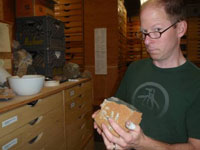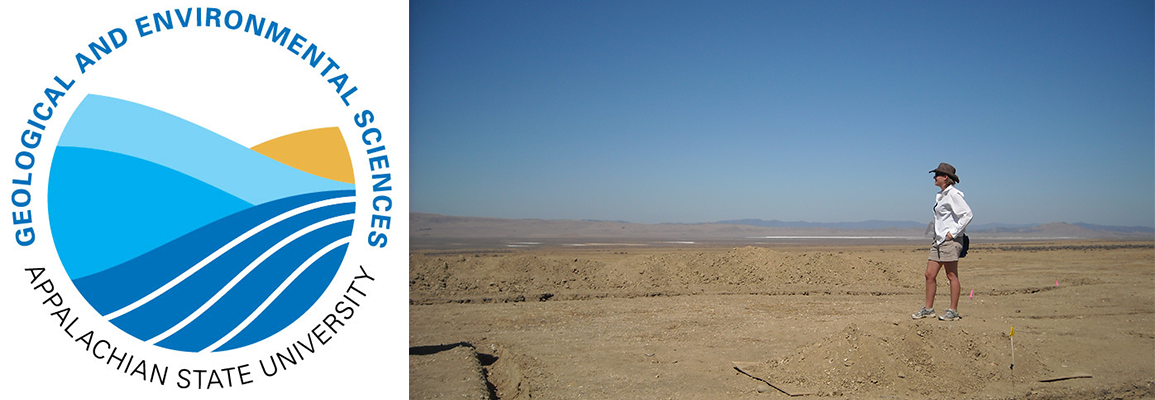Ask-A-Geologist
 Geoscientists do more than just look at rocks and minerals. We are happy to answer questions that you may have about the natural environment around you - rocks, minerals, fossils, landslides, earthquakes, water quality, fracking, climate... we have expertise in all fields of earth science. Ask-a-Geologist is a service we provide to the community free of charge, but please be aware that administering this program is not our department's primary mission.
Geoscientists do more than just look at rocks and minerals. We are happy to answer questions that you may have about the natural environment around you - rocks, minerals, fossils, landslides, earthquakes, water quality, fracking, climate... we have expertise in all fields of earth science. Ask-a-Geologist is a service we provide to the community free of charge, but please be aware that administering this program is not our department's primary mission.
Questions about local geology
- We have a number of useful pages about local geology, local earthquakes, local water resources, fracking in North Carolina, landslides in western NC, etc.
Help with mineral/rock/fossil identification
- Most minerals collected in western NC can be identified using our mineral ID tables.
- You can also send an email with high-resolution, clear images and details about where you found your specimen to Anthony Love at askageologist@appstate.edu for assistance. When you send Anthony an email, please be aware of how Ask-a-Geologist works:
- Our agenda is to identify your geological sample (if we can) and answer your geology questions. We have limited familiarity with archaeological artifacts; please contact the Department of Anthropology if you want archaeological artifacts identified.
- Feel free to request we personally examine a sample (if we can arrange it, we will try!)
- We cannot identify specimens based off blurry or low-resolution images, or shaky video that does not show the specimen clearly. Please be sure your images are clear and well-lit. Including some sort of a scale in the image (a ruler, or a standard-sized object such as a pen, key, or coin) is very helpful .
- We do not provide estimates for the monetary value of your specimen or your land.
- We are not qualified to test gemstones; please contact a licensed jeweler for that purpose.
- We use established scientific principles to identify your samples; our professional opinion may therefore differ from your personal hypothesis.
- We get a lot of requests, so please be patient. If we have not gotten back to you within a week, please reach out again. Remember, this is a service we provide to the community free of charge, and it is not our department's primary mission.
- If you think you have a meteorite...
- See how heavy it is. Does it feel unusually heavy for its size, and does a magnet stick to it? Or is relatively light or full of holes and nonmagnetic? If it's relatively light or normal weight compared to other rocks, and contains holes, and is not magnetic, it's likely a piece of volcanic rock used as ballast/fill or slag from an old industrial furnace. Volcanic rocks and furnace slag sometimes look like a meteorite but they are lighter and generally not magnetic.
- It used to be very common to use furnace slag in place of rip-rap or gravel, and furnace slag is commonly found along old railroad tracks where steam trains used to travel.
- Volcanic rocks and other large, unusual-looking rocks can be found on NC beaches near shipping ports, where they were used as ship ballast, and can later wash ashore with storm surges.
- Before you contact Anthony, this site is a fantastic resource for determining if you have a meteorite: METEORITE OR METEORWRONG? Self-Test Check-List.
- If you think you have a dinosaur egg... where did you find it?
- If you found it in or near a stream, river, or on a cobble beach, you have an egg-shaped stream cobble due to weathering processes (the water acts as a rock tumbler), but it is not a fossilized egg.
- If you found it in the eastern or midwestern US, it is definitely not a dinosaur egg. The rocks are the wrong age and type for this.
- Dinosaur eggs are extremely rare, and even if the rock unit was deposited when dinosaurs roamed the Earth, eggs are only found in certain rock formations capable of preserving delicate structures. In the US, these locations are typically heavily regulated (National Parks or Monuments), and international locations with dinosaur eggs have extremely strict export laws, where trafficking fossils for personal collections is illegal.
- All that glitters is not gold...
- precious metals are very rare in the southeastern US, but gold-colored mica and pyrite (fools gold) are extremely common.
Visit us!
You can also visit the F. Kenneth & Marjorie J. McKinney Geology Teaching Museum at Appalachian State University to learn more about geology. It's free and open to the public.
